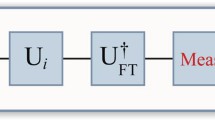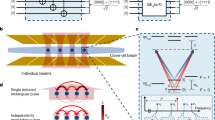Abstract
Quantum circuit model has been widely explored for various quantum applications such as Shors algorithm and Grovers searching algorithm. Most of previous algorithms are based on the qubit systems. Herein a proposal for a universal circuit is given based on the qudit system, which is larger and can store more information. In order to prove its universality for quantum applications, an explicit set of one-qudit and two-qudit gates is provided for the universal qudit computation. The one-qudit gates are general rotation for each two-dimensional subspace while the two-qudit gates are their controlled extensions. In comparison to previous quantum qudit logical gates, each primitive qudit gate is only dependent on two free parameters and may be easily implemented. In experimental implementation, multilevel ions with the linear ion trap model are used to build the qudit systems and use the coupling of neighbored levels for qudit gates. The controlled qudit gates may be realized with the interactions of internal and external coordinates of the ion.
Similar content being viewed by others
References
Nielsen M A, Chuang I S. Quantum Computation and Quantum Information. Cambridge: Cambridge University Press, 2000. 50–100
DiVincenzo D P. Two-bit gates are universal for quantum computation. Phys Rev A, 1995, 51: 1015–1022
Sleator T, Weinfurter H. Realizable universal quantum logic gates. Phys Rev Lett, 1995, 74: 4087–4090
Barenco A. A universal two-bit gate for quantum computation. Proc R Soc London Ser A, 1995, 449: 679–683
Barenco A, Bennett C H, Cleve R, et al. Elementary gates for quantum computation. Phys Rev A, 1995, 52: 3457–3467
Toffoli T. Reversible computing. Lect Notes Comput Sci, 1980, 84: 632–644
Muthukrishnan A, Stroud Jr C R. Multivalued logic gates for quantum computation. Phys Rev A, 2000, 62: 052309
Brennen G K, O’Leary D P, Bullock S S. Criteria for exact qudit universality. Phys Rev A, 2005, 71: 052318
Brylinski J L, Brylinski R. Universal quantum gates. In: Brylinski R K, Chen G, eds. Mathematics of Quantum Computation. Boca: Chapman & Hall/CRC Press, 2002. 99–113
Daboul J, Wang X, Sanders B C. Quantum gates on hybrid qudits. J Phys A-Math Gen, 2003, 36: 2525
Brennen G K, Bullock S S, O’Leary D P. Efficient circuits for exactuniversal computationwith qudits. Quantum Inf Comput, 2006, 6: 436–454
Zhou D L, Zeng B, Xu Z, et al. Quantum computation based on d-level cluster state. Phys Rev A, 2003, 68: 062303
Bullock S S, O’Leary D P, Brennen G K. Asymptotically optimal quantum circuits for d-level systems. Phys Rev Lett, 2005, 94: 230502
Li W D, Gu Y J, Liu K, et al. Efficient universal quantum computation with auxiliary Hilbert space. Phys Rev A, 2013, 88: 034303
Mischuck B, Molmer K. Qudit quantum computation in the Jaynes-Cummings model. Phys Rev A, 2013, 87: 022341
Gottesman D. Fault-tolerant computation with higher dimensional systems. Chaos Soliton Fractal, 1999, 10: 1749–1758
Fujiwara M, Takeoka M, Mizuno J, et al. Exceeding the classical capacity limit in a quantum optical channel. Phys Rev Lett, 2003, 90: 167906
Cortese J. Holevo-Schumacher-Westmoreland channel capacity for a class of qudit unital channels. Phys Rev A, 2004, 69: 022302
Collins D, Gisin N, Linden N, et al. Bell inequalities for arbitrarily high-dimensional systems. Phys Rev Lett, 2002, 88: 040404
Ralph T C, Resch K, Gilchrist A. Efficient Toffoli gates using qudits. Phys Rev A, 2007, 75: 022313
Lanyon B P, Weinhold T J, Langford N K, et al. Manipulating biphotonic qutrits. Phys Rev Lett, 2008, 100: 060504
Lanyon B P, Barbieri M, Almeida MP, et al. Simplifying quantum logic using higher-dimensional Hilbert spaces. Nat Phys, 2009, 5: 134–140
Nikolopoulos G M, Ranade K S, Alber G. Error tolerance of two-basis quantum-key-distribution protocols using qudits and two-way classical communication. Phys Rev A, 2006, 73: 032325
Molina-Terriza G, Vaziri A, Rehacek J, et al. Triggered qutrits for quantum communication protocols. Phys Rev Lett, 2004, 92: 167903
Groblacher S, Jennewein T, Vaziri A, et al. Experimental quantum cryptography with qutrits. New J Phys, 2006, 8: 75
Bruß D, Macchiavello C. Optimal eavesdropping in cryptography with three-dimensional quantum states. Phys Rev Lett, 2002, 88: 127901
Cerf N J, Bourennane M, Karlsson A, et al. Security of quantum key distribution using d-level systems. Phys Rev Lett, 2002, 88: 127902
Karimipour K, Bahraminasab A, Bagherinezhad S. Quantum key distribution for d-level systems with generalized Bell states. Phys Rev A, 2002, 65: 052331
Ann K, Jaeger G. Entanglement sudden death in qubit-qutrit systems. Phys Lett A, 2008, 372: 579–583
Song W, Chen L, Zhu S L. Sudden death of distillability in qutrit-qutrit systems. Phys Rev A, 2009, 80: 012331
Walborn S P, Lemelle D S, Almeida M P, et al. Quantum key distribution with higher-order alphabets using spatially encoded qudits. Phys Rev Lett, 2006, 96: 090501
Chen L B, Lu H. Nonlocal unambiguous discrimination among N nonorthogonal qudit states lying in a higher-dimensional Hilbert space. Sci China-Phys Mech Astron, 2012, 55: 55–59
Zhang Z Y, Liu Y M, Zhang W, et al. Criterion and flexibility of operation difficulty for perfect teleportation of arbitrary n-qutrit state with (n: n)-qutrit pure state. Sci China-Phys Mech Astron, 2011, 54: 1476–1480
Cao Y, Peng S G, Zheng C, et al. Quantum Fourier transform and phase estimation in qudit system. Commun Theor Phys, 2011, 55: 790–794
Ivanov P A, Kyoseva E S, Vitanov N V. Engineering of arbitrary U(N) transformations by quantum Householder reflections. Phys Rev A, 2006, 74: 022323
O’ullivan-Hale M N, Khan I A, Boyd R W, et al. Pixel entanglement: Experimental realization of optically entangled d = 3 and d = 6 qudits. Phys Rev Lett, 2005, 94: 220501
Rousseaux B, Guerin S, Vitanov N V. Arbitrary qudit gates by adiabatic passage. Phys Rev A, 2013, 87: 032328
Neeley M, Ansmann M, Bialczak R C, et al. Emulation of a quantum spin with a superconducting phase qudit. Science, 2009, 7: 722–725
Author information
Authors and Affiliations
Corresponding author
Rights and permissions
About this article
Cite this article
Luo, M., Wang, X. Universal quantum computation with qudits. Sci. China Phys. Mech. Astron. 57, 1712–1717 (2014). https://doi.org/10.1007/s11433-014-5551-9
Received:
Accepted:
Published:
Issue Date:
DOI: https://doi.org/10.1007/s11433-014-5551-9




